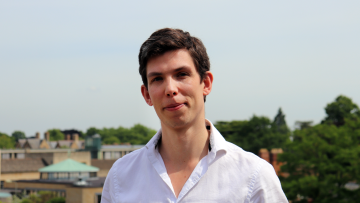and Self-Expanders
and Self-Expanders
15:30
Simple homotopy types of 4-manifolds
Abstract
Two CW-complexes are simple homotopy equivalent if they are related by a sequence of collapses and expansions of cells. It implies homotopy equivalent as is implied by homeomorphic. This notion proved extremely useful in manifold topology and is central to the classification of non-simply connected manifolds up to homeomorphism. I will present the first examples of two 4-manifolds which are homotopy equivalent but not simple homotopy equivalent, as well as in all higher even dimensions. The examples are constructed using surgery theory and the s-cobordism theorem, and are distinguished using methods from algebraic number theory and algebraic K-theory. I will also discuss a number of new directions including progress on classifying the possible fundamental groups for which examples exist. This is joint work with Csaba Nagy and Mark Powell.
CANCELLED -- Classifying rigid Frobenius algebras in Dijkgraaf-Witten categories and their local modules
Abstract
THIS TALK IS CANCELLED DUE TO ILLNESS -- In this talk I will present classification results for rigid Frobenius algebras in Dijkgraaf–Witten categories ℨ( Vec(G)ᵚ ) over a field of arbitrary characteristic, generalising existing results by Davydov-Simmons. For this purpose, we provide a braided Frobenius monoidal functor from ℨ ( Vect(H)ᵚˡᴴ ) to ℨ( Vec(G)ᵚ ) for any subgroup H of G. I will also discuss about their categories of local modules, which are modular tensor categories by results of Kirillov–Ostrik in the semisimple case and Laugwitz–Walton in the general case. Joint work with Robert Laugwitz (Nottingham) and Sam Hannah (Cardiff).
Oxford Mathematician James Maynard has been awarded a 2023 New Horizons Prize for Early-Career Achievements in Mathematics in recognition of his multiple contributions to analytic number theory, and in particular to the distribution of prime numbers.
14:00
CDT in Mathematics of Random Systems December Workshop 2022
Abstract
2:00 Julian Sieber
On the (Non-)stationary density of fractional SDEs
I will present a novel approach for studying the density of SDEs driven by additive fractional Brownian motion. It allows us to establish smoothness and Gaussian-type upper and lower bounds for both the non-stationary as well as the stationary density. While the stationary density has not been studied in any previous works, the former was the subject of multiple articles by Baudoin, Hairer, Nualart, Ouyang, Pillai, Tindel, among others. The common theme of all of these works is to obtain the results through bounds on the Malliavin derivative. The main disadvantage of this approach lies in the non-optimal regularity conditions on the SDE's coefficients. In case of additive noise, the equation is known to be well-posed if the drift is merely sublinear and measurable (resp. Holder continuous). Relying entirely on classical methods of stochastic analysis (avoiding any Malliavin calculus), we prove the aforementioned Gaussian-type bounds under optimal regularity conditions.
The talk is based on a joint work with Xue-Mei Li and Fabien Panloup.
2:45 Thomas Tendron
A central limit theorem for a spatial logistic branching process in the slow coalescence regime
We study the scaling limits of a spatial population dynamics model which describes the sizes of colonies located on the integer lattice, and allows for branching, coalescence in the form of local pairwise competition, and migration. When started near the local equilibrium, the rates of branching and coalescence in the particle system are both linear in the local population size - we say that the coalescence is slow. We identify a rescaling of the equilibrium fluctuations process under which it converges to an infinite dimensional Ornstein-Uhlenbeck process with alpha-stable driving noise if the offspring distribution lies in the domain of attraction of an alpha-stable law with alpha between one and two.
3:30 Break
4:00-5:30 Careers Discussion
|
Immersive Finance, Founder, and Oxford Mathematics, Visiting Lecturer in Mathematical Finance |
Oxford Mathematics, Professor of Numerical Optimisation |
Smith Institute, Chief Technical Officer |
Tesco, Data Science Manager |


